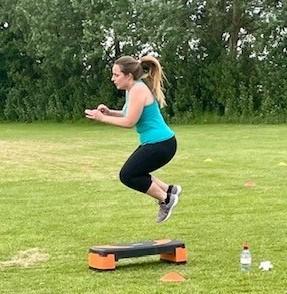
6 minute read
New Fitness at Frettenham Village Hall


Advertisement

Heart Disease
Knowing the early signs of heart disease can really make a difference to your pet’s life. Heart disease is any condition of the heart or great blood vessels which affects the way the heart works and prevents blood and therefore oxygen being transported normally around
the body. It is estimated that heart problems can affect up to 10% of dogs and cats in the UK. Some heart diseases may be present when the animal is born, however the majority develop in adulthood. Whilst some heart diseases are mild and cause no symptoms or problems whatsoever in the animal’s lifetime, others may cause severe problems, even sudden death, so an early accurate diagnosis is essential.
Diagnosis:
What are the signs of a problem?
Cats are very good at hiding signs of heart disease (and it's often harder to pick up these changes at home as we don't tend to take our cats for a walk around the block!).
The signs to look out for in both dogs and cats:
· Laboured or fast breathing - the most common sign in cats · An enlarged abdomen · Weight loss or poor appetite · Cyanosis (where the gums become blue in colour)
Signs to look out for in dogs only:
· Coughing · · PleaseA reluctance to exercise and tiring more easily on walks Weakness or fainting associated Keep with exercise Sometimes the only symptom of a problem is a heart murmur or an Safe!irregularity in the heart rhythm picked up by your vet at a routine examination. If we are concerned about your pet's heart, we will initially recommend echocardiography (ultrasound scan of the heart), we may also advise an ECG, blood pressure checks and blood tests. The echocardiography is the most important tool, as it can show the structure of the heart, in particular it can show if it is enlarged, along with how effectively it is functioning.
Some common types of heart disease we see:
· Mitral Valve Disease (MVD) is by far the most common acquired heart disease in dogs. This can affect any breed but is more commonly seen in the smaller dogs. In this condition the valve becomes leaky, eventually leading to heart failure. · Hypertrophic Cardiomyopathy (HCM) is the most common form of heart disease in cats. The muscle of the heart thickens, preventing the heart from pumping properly. This condition can be both a disease on its own, or caused by other illnesses such as an overactive thyroid gland. · Dilated Cardiomyopathy (DCM), is more common in dogs than cats, is a condition where the · heart muscle thins and weakens, reducing its ability to pump effectively. · Occasionally we find cancers of the heart muscle or pericardium (the sac the heart sits in) · Congenital Heart Diseases are seen less often but may include malformations of valves or a failure of the closure of a blood vessel after birth.
Treatment:
Thankfully we have several medications available to help improve your pet's heart function and therefore their quality of life. Management of heart disease is advancing quickly; recent studies have shown that early treatment when there are any signs of heart enlargement can help your pet lead a much longer and happier life. If your pet has any of these signs, or just for a routine health check then give our team a call on 01603 783920.
David Martin BVM&S MRCVS
29 37
NEW: FITNESS CLASSES AT FRETTENHAM VILLAGE HALL
What does being fit mean to you? Ignore the science for a moment.....does it mean one thing? Or lots of things? Why do you (or should you) work out? The most common answer I hear is “to lose weight”. Is that really it? For me, fitness runs deeper than that.
How about to feel better about yourself? To have more energy? To be more active and promoting this health and wellbeing to your children and loved ones? To feel so confident not just about how you look, but about how much stronger you have become, both physically and mentally? To know you’re able to push yourself in a workout, to keep going when your body is telling you to stop, makes life’s little challenges so much easier. You know you are stronger than you think. You develop this positive mindset. You approach things differently. You learn how to pace yourself and push yourself simultaneously. What an awesome skill set to have. You have a healthy release from stress which doesn’t involve anything that’s detrimental to your wellbeing.

During a time when most of us are experiencing mental health challenges, evidence shows that being physically active is a great way to improve your mental wellbeing. · The NHS recommend that adults
Aim to be physically active every day. Any activity is better than none, and more is better still · Do strengthening activities that work all the major muscles (legs, hips, back, abdomen, chest,
shoulders and arms) on at least 2 days a week · Do at least 150 minutes of moderate intensity activity a week or 75 minutes of vigorous intensity activity a week · Reduce time spent sitting or lying down and break up long periods of not moving with some activity.
Being physically active is easier than you think, especially if you make activity part of your daily routine. Here are some easy wins: · Set a time for activity and stick to it - make a commitment to yourself and block out your diary! · Plan your activity with a friend, that way you won't cancel · Find ways to get extra steps in.
Walk your children to and from school, park further away from the shop, get off the bus a stop earlier or just leave the car at home and cycle or walk. · Exercise during your lunch break.
Your office may have a gym, or you may have access to a nearby swimming pool or squash courts. · Join me at Frettenham Village
Hall for some fun ,fitness circuits to kick start your fitness journey locally with likeminded people. People often say to me "I wish I could love exercising as much as you do". The truth is I don’t love it all the time! It’s hard work trying to balance work, life, kids, study and keeping fit and healthy. But for me the feeling you get immediately after a workout and from becoming a fitter and stronger version of you, makes it all worth it. It becomes higher up on your list of priorities. Especially during these tough times. Keep fit (and well!)


38 26

Vicki
Hall Health & Fitness
To find out more about classes at Frettenham Village Hall visit www.hallhealthfitness.co.uk or drop me an email at: hallhealthfitness@gmail.com or text 07767 463816.


















